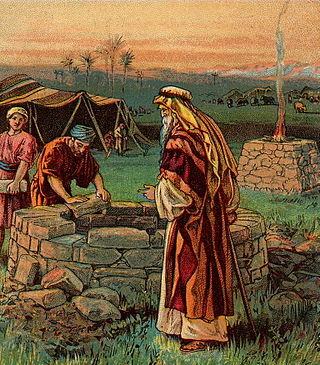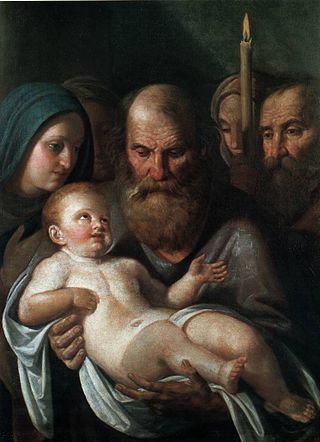
Abraham is the common Hebrew patriarch of the Abrahamic religions, including Judaism, Christianity, and Islam. In Judaism, he is the founding father of the special relationship between the Jews and God; in Christianity, he is the spiritual progenitor of all believers, whether Jewish or non-Jewish; and in Islam, he is a link in the chain of Islamic prophets that begins with Adam and culminates in Muhammad.

Isaac is one of the three patriarchs of the Israelites and an important figure in the Abrahamic religions, including Judaism, Christianity, and Islam. Isaac first appears in the Book of Genesis, later adopted by the Hebrew tradition of the Torah, in which he is considered to be the son of Abraham and Sarah, the father of Jacob and Esau, and the grandfather of the twelve tribes of Israel.

Palm Sunday is the Christian moveable feast that falls on the Sunday before Easter. The feast commemorates Christ's triumphal entry into Jerusalem, an event mentioned in each of the four canonical Gospels. Its name originates from the palm branches waved by the crowd to greet and honor Jesus Christ as he entered the city. Palm Sunday marks the first day of Holy Week; in Western Christianity, this is the beginning of the last week of the solemn season of Lent, preceding Eastertide, while in Eastern Christianity, Holy Week commences after the conclusion of Great Lent.
Yaqub ibn Ishaq ibn Ibrahim, later given the name Israil, is recognized by Muslims as an Islamic prophet. He is held to have preached the same monotheism as his forefathers: Abraham, Ishmael, and Isaac.
The House of Joseph is a designation which members of the Church of Jesus Christ of Latter-day Saints apply to the ancient "birthright" tribe of the house of Israel (Jacob) as it is described in the Old Testament, made up of the tribes of Ephraim and Manasseh. The tribes' namesakes — the two sons of Joseph of Egypt — are first mentioned in Genesis 41:50-52.
The New Covenant is a biblical interpretation which was originally derived from a phrase which is contained in the Book of Jeremiah, in the Hebrew Bible.

Aug. 31 - Eastern Orthodox liturgical calendar - Sep. 2

July 19 - Eastern Orthodox Church calendar - July 21

Simeon at the Temple is the "just and devout" man of Jerusalem who, according to Luke 2:25–35, met Mary, Joseph, and Jesus as they entered the Temple to fulfill the requirements of the Law of Moses on the 40th day from Jesus' birth, i. e. the presentation of Jesus at the Temple.
In Christianity, the Nativity Fast—or Fast of the Prophets in Ethiopian Orthodox Tewahedo Church and Eritrean Orthodox Tewahedo Church—is a period of abstinence and penance practiced by the Eastern Orthodox Church, Oriental Orthodox Church and Catholic Church in preparation for the Nativity of Jesus on December 25. Ethiopian and Eritrean Orthodox Churches commence the season on November 24 and end the season on the day of Ethiopian Christmas, which falls on January 7. The corresponding Western season of preparation for Christmas, which also has been called the Nativity Fast and St. Martin's Lent, has taken the name of Advent. The Eastern fast runs for 40 days instead of four or six weeks and thematically focuses on proclamation and glorification of the Incarnation of God, whereas the Western Advent focuses on three comings of Jesus Christ: his birth, reception of his grace by the faithful, and his Second Coming or Parousia.

The priesthood of Melchizedek is a role in Abrahamic religions, modelled on Melchizedek, combining the dual position of king and priest.

March 11 - Eastern Orthodox liturgical calendar - March 13

The Benedictus, given in Gospel of Luke 1:68–79, is one of the three canticles in the first two chapters of this Gospel, the other two being the "Magnificat" and the "Nunc dimittis". The Benedictus was the song of thanksgiving uttered by Zechariah on the occasion of the circumcision of his son, John the Baptist.
This is a calendar of saints list for the Armenian Apostolic Church.

October 8 - Eastern Orthodox liturgical calendar - October 10

August 20 - Eastern Orthodox liturgical calendar - August 22

November 11 - Eastern Orthodox liturgical calendar - November 13

December 12 - Eastern Orthodox liturgical calendar - December 14







